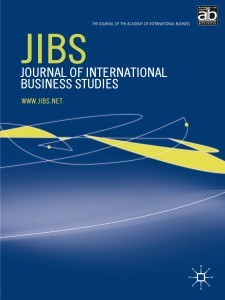
Witte, C., Burger, M., Ianchovichina, E. and Pennings, E. (2017). Dodging bullets: the heterogeneous effect of political violence on greenfield FDI Journal of International Business Studies, 48(7):862--892.
-
Affiliated authors
-
Publication year2017
-
JournalJournal of International Business Studies
The relationship between political violence and greenfield foreign direct investment is contingent on the type of violence, characteristics of the investment-receiving sector, and extent to which the investing firm is geographically diversified. This paper presents an analysis with a dynamic fixed effects model for a panel of 90 developing countries from 2003 to 2012. The analysis shows that nationwide political conflict is negatively associated with total and non-resource-related greenfield foreign direct investment, but not with resource-related greenfield foreign direct investment. The insensitivity to political conflict of multinational firms in the resource sector is associated with the high profitability of natural resource extraction and the companies' geographic constraints on location choice during the period of estimation. In the non-resource sector, the less geographically diversified firms are most sensitive to the risk of conflict.